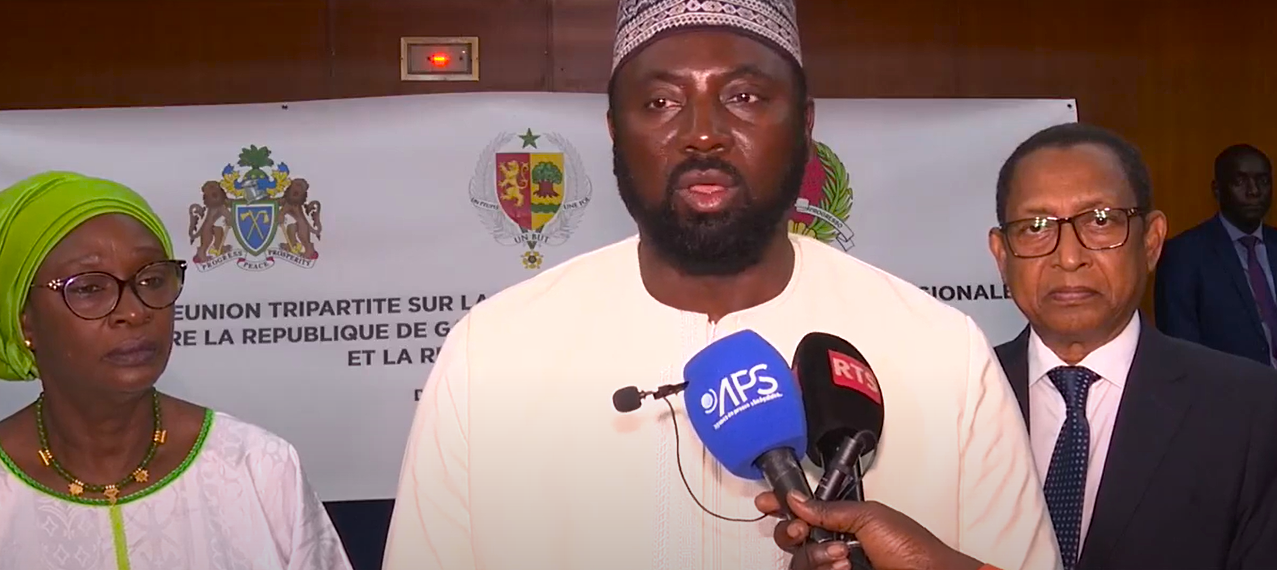Gambiaj.com – (DAKAR, Senegal) – Authorities from Senegal, The Gambia, and Guinea-Bissau are joining forces to implement pragmatic mechanisms for enhancing cross-border cooperation and regional integration. In a groundbreaking move, the three nations convened the first tripartite meeting on regional cooperation in Dakar, Senegal’s capital. This meeting represents a shift from traditional bilateral collaboration to a more dynamic and innovative partnership among the three West African neighbours.
The discussions focused on harmonizing positions and developing a framework that extends beyond existing cooperation. Experts from the three countries worked to align strategies and expand the scope of cooperative efforts in key sectors, including agriculture, livestock, and trade. The agreements signed during the meeting underscore the commitment of Senegal, The Gambia, and Guinea-Bissau to advancing sub-regional integration and mutual benefits.
Senegal’s Minister of African Integration and Foreign Affairs, Yassine Fall, highlighted the significance of these agreements, noting that they pave the way for economic collaboration across critical sectors. “Agreements have been concluded regarding livestock to enhance our capacities, develop livestock farming, and improve access to animal resources. Additionally, agreements on trade will not only facilitate internal exchanges but also promote collective imports and exports,” Fall said.
The accords also aim to boost cooperation between the three nations while positioning them as key players in the broader regional and global economy. The partnership between Senegal, The Gambia, and Guinea-Bissau marks a significant milestone in regional integration efforts.
Gambian Foreign Minister, Mamadou Tangara, praised the tripartite initiative as a reflection of strong political will. “This meeting signifies a commitment to transforming discussions on integration into actionable results. The agreements we’ve signed will benefit not just our generation but future ones by laying a solid foundation for continued cooperation and growth,” he said.
Guinea-Bissau’s Foreign Minister, Carlos Pinto Pereira, echoed these sentiments, emphasizing that these agreements are essential for driving sub-regional cooperation. He stressed the importance of enabling free movement for people, goods, and entrepreneurs within the region, ensuring that the resources necessary for economic development are fully utilized. “The mechanism for ongoing evaluation and monitoring will be crucial in translating these agreements into tangible outcomes,” Pereira added.
Adding to these developments, Gambia’s Minister of Industry, Trade, Regional Integration, and Labor, Baboucarr Ousmaila Joof, announced the establishment of a special economic zone in Casamance, Senegal. This tripartite industrial zone aims to foster industrial production and create a hub for economic growth in the region, signalling a major step forward in the cooperation between the three countries.
The agreements and initiatives resulting from this meeting mark a turning point in regional diplomacy, signaling a unified approach to tackling shared challenges and unlocking economic potential across the borders of Senegal, The Gambia, and Guinea-Bissau. The collaboration sets an example of how neighbouring countries can work together to achieve broader African integration goals, creating pathways for sustainable development and prosperity in the sub-region.










